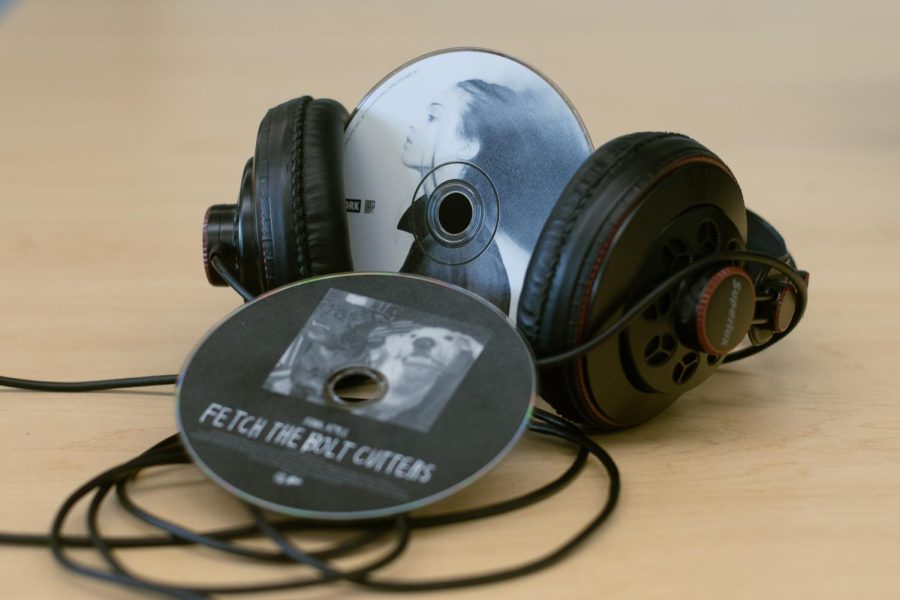Fiona Apple Forever: A Discography As Honest as It Is Diverse
As a classically trained pianist, Apple blends elements of jazz, pop, blues, and percussion — giving her music a distinctive sound.
May 4, 2022
I do not think there is an artist more authentic than Fiona Apple. Her discography consists of six albums that were released over the span of 26 years. She has even occasionally released albums eight years apart from each other, which her meticulous songwriting process requires.
Since many of Apple’s album releases are so far apart, it is easy to notice the changes in her composition when comparing them. But on Apple’s tracks, you can always count on brilliant lyricism and striking emotions.
Some critique her for her constantly melancholic lyrics, but Apple has a different approach to songwriting than other musicians. She does not sit down to write a song unless she feels like she is overwhelmed by emotion and writing a song will make her feel better. She takes her pain out on the piano.
Listening to her albums in chronological order, the shift in Apple’s attitude is extremely noticeable. Her music starts out full of teenage angst and anger, but transitions into mature lyricism full of self-awareness while she explores new creative ways of composing.
Apple does not care about fame. In fact, she despises it. Because of her disdain for celebrity culture, when she first emerged into the spotlight she was labeled ungrateful and snobby. Her now-iconic acceptance speech at the 1997 MTV VMA awards was a message for young people who modeled their lives after celebrities. “You shouldn’t model your life about what you think that we think is cool,” she said. “Go with yourself.”
Apple now enjoys her life off of social media and distant from the spotlight. She resides with her housemate Zelda Hallman and pitbull Mercy. Sometimes, she sends Sunday updates to the YouTube channel Fiona Apple Rocks.
Below are my go-to Fiona Apple hits.
“Criminal”
Apple’s breakout single is about desiring control in any aspect of her life, even if it meant hurting others. The song, which she wrote in only 45 minutes, is full of upbeat piano riffs and impressive runs. The official music video for “Criminal” sparked controversy, subjecting Apple to slut shaming and body shaming. In 1997 she told Interview Magazine “I’ve gone through stages where I hate my body so much that I won’t even wear shorts and a bra in my house because if I pass a mirror that’s the end of my day. So it was a personal mission to do that video. To get up in front of all those gorgeous girls and strut my stuff. To convince myself, You’ve got something else going on here. It was a huge step. But in the end, the truth is it’s fun to be up there and know that you’re in your underwear. Even though I know I’m exploiting my sexuality in a certain way, it’s fun! It boosts my ego. Which is exactly what the song is about.”
“Paper Bag”
“Paper Bag” captures the feeling of heartbreak knowing that someone does not understand you. Apple uses the metaphor, “I thought it was a bird but it was just a paper bag,” to illustrate a man who was not the person she thought he was.
“Extraordinary Machine”
The title track from Apple’s long-awaited third album, “Extraordinary Machine,” is the first major shift in Apple’s style. The two previous albums are full of intense negative emotions, but for the first time, Apple is passionately singing about self-love. “Extraordinary Machine” marvels about the inherent resilience that comes with being a person.
“I Want You To Love Me”
“I Want You To Love Me” is a song about self confidence as much as it is about the desire to be loved. Apple told Vulture that the song was about “that whole thing of, ‘If a tree falls in the forest and no one’s around to hear it, does it make a sound?’” she said. “Yes, it does. Because a vibration happens. Whether or not you’re there to hear it. I exist whether or not you see me. These things about me are true whether or not you acknowledge them.”
“Under the Table”
“Under the Table” is yet another example of Apple’s contempt for celebrity culture. This song “was inspired by a particular dinner where there was lots of expensive wine and lots of bragging about things I wouldn’t brag about.” Apple said. “I won’t say too much about it, but somebody said something I thought was offensive. It was not the kind of dinner where you’re supposed to call somebody out. But I didn’t want to be there in the first place. So I called the guy out.”
“Ladies”
“Ladies” is a beautiful documentation of Apple starting to heal her internalized misogyny. In this song she is refusing to let a man come between her and another woman. She describes misogyny as a “revolving door” that turns good women against each other.





